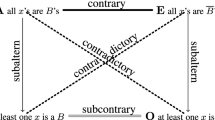Abstract.
Each predicate of the Aristotelian square of opposition includes the word “is”. Through a twofold interpretation of this word the square includes both classical logic and non-classical logic. All theses embodied by the square of opposition are preserved by the new interpretation, except for contradictories, which are substituted by incommensurabilities. Indeed, the new interpretation of the square of opposition concerns the relationships among entire theories, each represented by means of a characteristic predicate. A generalization of the square of opposition is achieved by not adjoining, according to two Leibniz’ suggestions about human mind, one more choice about the kind of infinity; i.e., a choice which was unknown by Greek’s culture, but which played a decisive role for the birth and then the development of modern science. This essential innovation of modern scientific culture explains why in modern times the Aristotelian square of opposition was disregarded.
Similar content being viewed by others
Author information
Authors and Affiliations
Corresponding author
Additional information
This work was completed with the support of our \(\rm{T_{E}X}\)-pert.
Rights and permissions
About this article
Cite this article
Drago, A. The Square of Opposition and the Four Fundamental Choices. Log. univers. 2, 127–141 (2008). https://doi.org/10.1007/s11787-007-0032-9
Received:
Accepted:
Published:
Issue Date:
DOI: https://doi.org/10.1007/s11787-007-0032-9



